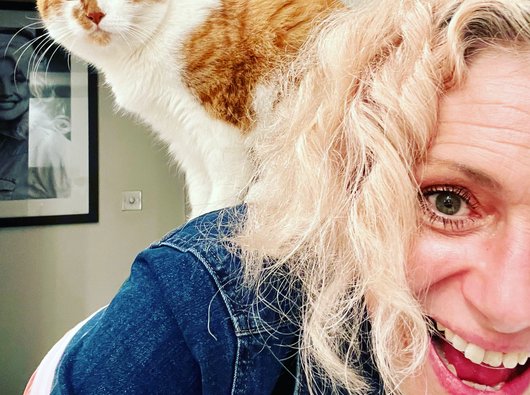Looking after yourself with CML
Explore simple things you can do for yourself, alongside any treatment your hospital recommends, to look after your physical and mental health.
Managing fatigue
Fatigue is a feeling of extreme tiredness that can come on suddenly and leave you feeling completely drained. It’s a common symptom of CML, and can also be a side effect of your treatment. Fatigue can leave you feeling mentally as well as physically exhausted.
If you struggle with fatigue, evidence shows that regular gentle exercise such as walking can help. Lots of people with CML agree, and say that it’s important to pace yourself and not take on too much.
We have a separate section about fatigue, and we also have more information about working with blood cancer if fatigue makes it hard for you to manage your job or study.
Practising sun safety
Some drugs that are used to treat CML, for example hydroxycarbamide, are photosensitive. This means that taking them can increase your risk of developing skin cancer, as well as making you more likely to suffer from burns or blisters when you are out in the sun.
If you’ve had a stem cell transplant with donor cells, being out in the sun without protection can also increase your chance of GvHD (graft vs host disease). This happens when your immune system attacks your donor’s stem cells.
Always wear sunscreen or cover your skin, and read our other tips on keeping yourself safe in the sun.
Staying hydrated
The NHS’s Eat Well Guide recommends drinking 6 to 8 glasses of water, or other low fat and low sugar drinks, every day. This can include tea and coffee (as long as the milk is low-fat and you don’t add sugar).
Ask your hospital team about how much fluid you should be aiming to drink each day, and if there are any drinks you should avoid or have less of.
Eating well
It’s important to eat well and enjoy what you eat. Unless your hospital team gives you special instructions, it’s best to follow general advice on eating a healthy, balanced diet. Stick with food safety guidelines to avoid infections from things you eat and drink.
If you’re taking TKIs, it’s important to avoid eating grapefruits or drinking grapefruit juice. This is because they can stop the drugs being absorbed properly, potentially making them less effective.
We have more information about eating well with blood cancer.
Keeping active
It’s important to stay as active as you can, even if the CML or your treatment is making you feel tired. Exercise can help to boost your mood as well your overall fitness, and you don’t have to do anything high impact. Gentle exercise such as walking, gardening or yoga can be effective.
Choosing something that you like doing and that you can easily include in your daily routine will make it easier to keep up with. You can also involve family and friends, or join a new class in your local area.
See our ideas about how to stay active safely when you have blood cancer.
"Don’t be afraid to talk about how you really feel, and ask for extra support if you need it. Your mental health is just as important as your physical health, and it’s worth just as much care and attention."
Maggie, living with CML since 2012.
Read Maggie's story about the importance of seeking extra support if you need it.

Looking after your mental health
It's completely normal to feel shocked, upset or frightened when you’re told you have CML. Lots of people say that when the doctor or nurse first explained their diagnosis, “cancer” or “leukaemia” was the only thing that stuck in their head.
This can be hard to process, and getting a CML diagnosis can affect you emotionally and psychologically as well as physically. It may take some time for the diagnosis to sink in, and you could have good days and bad days.
There are lots of things you can try that might help you feel better, including:
- Staying connected with loved ones and spending time doing things you enjoy. Activities and hobbies can help keep you fit and healthy as well as being a good distraction, and you can explore doing them alone or with friends and family.
- Practising mindfulness. Some people find mindfulness activities like meditation and yoga helpful – our mind and emotions page has some videos you can follow, as well as more ideas about how you can look after yourself and your mental health.
- Sharing your worries. Many people have told us that they find it helpful to talk about what they’re going through, and others prefer to chat about different things to help take their mind off their worries. How and what you share is up to you, and what feels best for you might change over time.
It’s also worth knowing that you shouldn’t put pressure on yourself to feel OK all of the time. Living with CML takes some getting used to, and you might experience setbacks as well as making progress.
If you experience anxiety, depression or panic, or you just feel like you need someone to talk to, you can ask your GP or hospital team to refer you for free NHS counselling. If you prefer, you can self-refer in England online. You can also look for a private therapist through the British Association for Counselling and Psychotherapy.
You might also find it useful to open up about how you feel with your hospital team. They should be able to answer any questions or worries you have, and recommend things to help.
Helping your family and friends
Your loved ones will want to support you in any way they can, but they may also find the news about your diagnosis hard to cope with. They are more than welcome to call or email our Support line to ask questions or share their own worries, and you might want to show them this web section or order them one of our free printed booklets.
Here are some other suggestions you can try:
- Give people trustworthy information. This can help to manage their fears and stop them from googling things that might be out of date, unbalanced or untrue.
- Set boundaries together. Some people will want to share everything about their diagnosis with those closest to them, whereas others might want to keep the finer details to themselves. Having a conversation about your preferences and expectations can help to avoid any challenges or hurt feelings. You could think about how often you might want to update people, what you want to say, and who needs to know what.
- Ask for help. Lots of people find that asking their friends and family to do something practical for them actually helps both of you. People often feel better when they have a role to play, and they might be able to support you in a way that makes your life easier. Think about what you might need – ideas include help with childcare, feeding a pet, housework, or even just inviting some round for a coffee and a chat to take your mind off things.
"My mum has come to a few of my appointments with me and spoken to my consultant. She knows I'm getting good care, and that's really helped her."
Sophie, living with CML since 2023.
Read Sophie's story about how to have hard conversations with your loved ones.

More tools and support
You can call our Support line for a chat about anything on 0808 2080 888, or join our online community forum. There are lots of people there who are going through the same or similar experiences to you, and you might find it helpful to start a conversation or just read through some existing posts.
